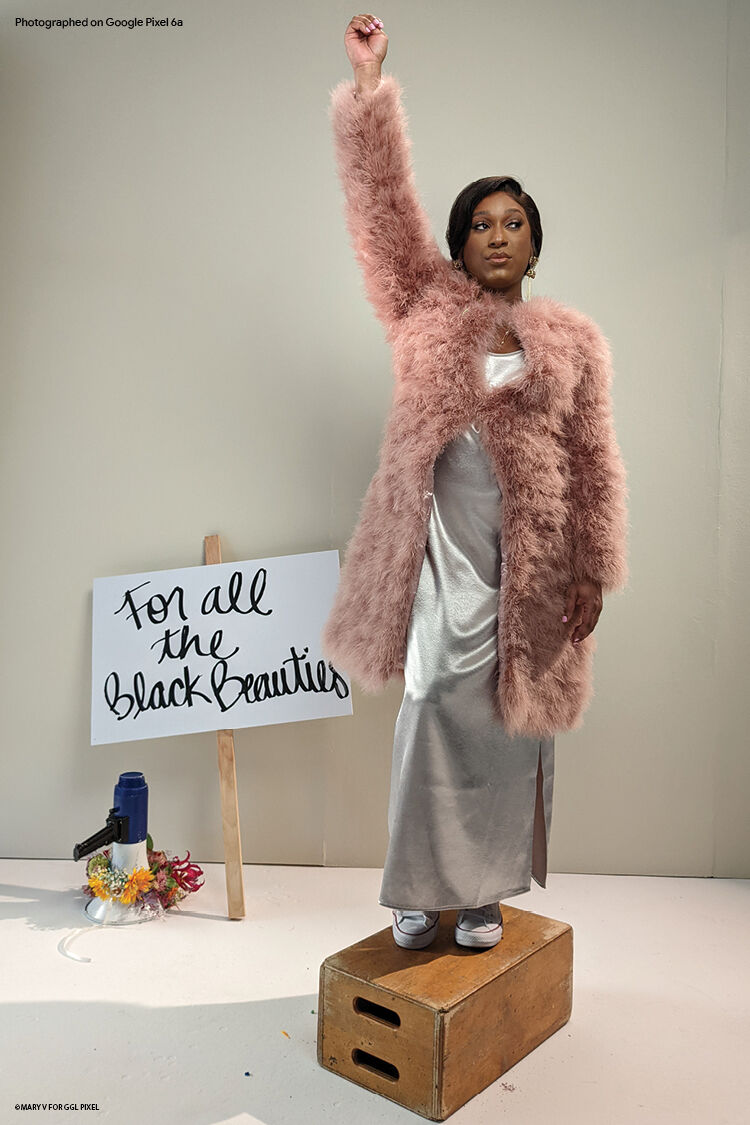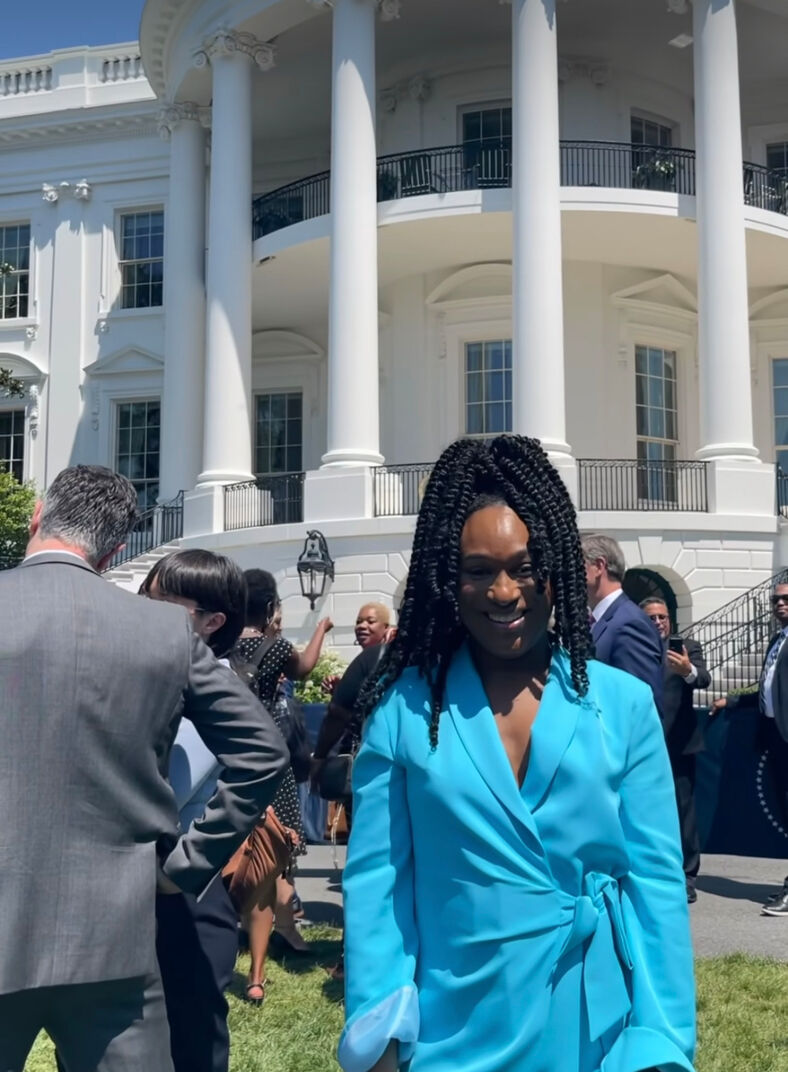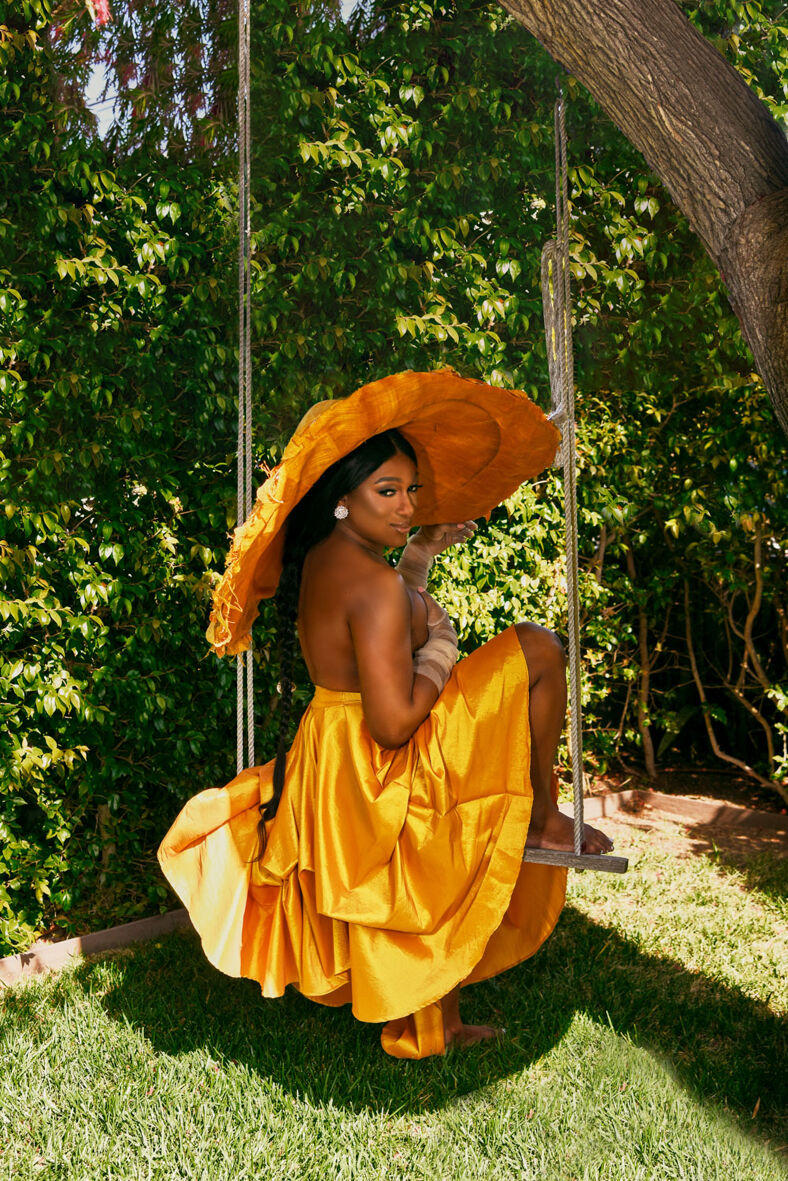Once upon a gay pride, I set up a table in the West Village where I sold sweet tea and bottled water in exchange for donations to my favorite non-profit. The table was called “Tea Under The Shade” and I donated the proceeds to the Marsha P. Johnson Institute. It wasn’t lost on me that I was asking for money in the same spot that Marsha P. Johnson once did. It only made sense to donate the money to the organization with her namesake.
I’ve always admired the organization and its founder, Elle Moxley. It goes without saying that I was thrilled to have a chance to speak with her.

Lara Americo: I don’t want to ruin my unbiased journalistic integrity but I really, really adore the work that you’ve done. I love what you do. And I’m so grateful that you’re doing it.
Elle Moxley: Thank you. It’s an honor to be honored.
It’s work that you have to do because you know you feel called to it and you love it so I’m grateful for my calling. Grateful that the love still exists after so many years of struggling and trying so hard to support this beautiful community.
My first question is kind of a broad one. Why does the Marsha P. Johnson Institute exist?
That’s such a big and broad question but, I love that question. Why do we exist and who do we exist for? When I founded the organization, those were two questions that not only I was asking, but people were asking those questions broadly. The Marsha P. Johnson Institute exists to protect and defend the human rights of black transgender people in the United States.
I did not see any organization like the Marsha P. Johnson Institute in this country or in the world I didn’t see an organization that not only was doing advocacy work but was also doing community building work and providing care and support and adoration for the community. I didn’t see that work being led by black trans women. I didn’t see any black trans women as the CEO or executive director of organizations that do work.
It felt really, really important to make sure that there was an organization that could centralize the voices of black trans people. That could also centralize an elevate the leadership of black trans people. I bet on myself and I knew that betting on myself ensured that I would be able to bet on the community that I’m a part of and that I love and that more people should stop betting on and actually just make real tangible investments into.
And I will also just add, for us as an organization we came into this work by doing a lot of the leading national advocacy work from my time as an organizer around the murders of black trans women. It wasn’t just in the LGBT space where that work would be elevated but because of my work as an organizer, I was able to elevate that into racial justice movements which created so much space and opportunity for a lot of the modern trans leaders that you see today who’re taking up positions of leadership and other organizations or in the world whether it’s on stages as performers and actors, or in the world of journalism and media. Without those efforts, mine specifically, we wouldn’t necessarily see the success that we have today. I knew that I needed to not only pay homage to my great efforts but before I could do that I needed to pay homage to women into people who came before.
Marsha P. Johnson is that person that we all owe so much to. So if there was going to be an organization to lead us to a new way of being–where trans people are not an afterthought but are the priority of conversation, it had to be named after Marsha P. Johnson.
I love that, so much. It actually brings me to my next question. It’s probably a difficult one to answer. Do you feel that Marsha P. Johnson would be proud of this work? And of this institute?
I love that question and welcome it. Some may think it’s a controversial question, but I am not afraid of those questions. What I know is that Marsha P. Johnson, in her own words, was not interested in being [extended pause] figuralized.
Based on our understanding of her life and her words. But what I also know is that and Marsha’s death that’s exactly what happened she became a heroic figure and the cultural zeitgeist of the understanding of transness. I think the question more specifically is, “Would Marsha be honored with the way that we all have remembered her?” I think it is irresponsible to put that question onto the backs of black trans people and to be specific, putting it on me. For trying to find a solution to something that has historically gone unanswered by people in this country but broadly.
I think we have to be more responsible about how we are erecting statues and figures and also how we are referencing people as heroes and angels. But I will say that I do believe that culture belongs to the people who created it. the Marsha P. Johnson Institute is a reflection that black trans people–we own our stories, we own our narrative, and we own our struggles. Because we know that we’re so much more than that.
I think that Marsha would be proud that there was an effort to not only acknowledge who she was but as an extension of who she was; so many more people get to be acknowledged. All of their blackness, all of their transness, all of their drag queen-ness. And in all of their black otherings, you get to acknowledge the beauty. I do think Marsha would be proud of that.
Or at least I hope so.
Thank you for that. I know that’s a tricky question to answer. There is one thing I love about how you present this work. Even right now, you’re masterful with your words–with how you dissect this stuff into words.
I love so much that you add art and performance into how you present this work. I guess I just wanted to ask you, why is that important?
Wow, well I’ll tell you why that’s important. I approach my work as an organizer and an activist as an artist first. Organizing and activism are something I had to do to survive. It wasn’t something I loved. I never set out to make a career out of this. It just so happens that because I think of everything as a singer first and as a dancer first, I always had a vision.
So for me, the vision has always been, how can I make something beautiful despite. How can I make something beautiful even though I’m standing in ruins? For me, art has been essential to my life and my understanding of purpose. But even more so, activism is beautiful and it has to be reflected that way. It has to be presented that way. Because if it’s not, then people only take away the hardship. They don’t take away the glory and the success of struggle.
I’ve always wanted to present blackness as I know it to be–which is beautiful. So much of the world’s activism and advocacy has been informed by the struggles of black people. In this country and abroad. We’re an artistic people. We’re a beautiful people. The work should always reflect that. Even paying homage to Marsha as an advocate–paying homage to her work. So much of it was influenced by her aesthetic. But also her own contributions–modeling for Andy Warhol and for being a part of the Hot Peaches. These were elements of her joy.
That’s part of why art has been so essential for the institute. It is where we find our joy and our our rest and our peace from the hardships of the world. We do not want to become a shrine for murdered black trans people. We need to be able to combat this in a way that is not necessarily just legislative or just throwing money at it. But how can we elevate our joy? Art is the way we found.

The institute releases an impact report every year and each year there are new wins and bigger accomplishments–which I’m very happy about. What wins can we look forward to in the next report?
Yeah, absolutely! We do our absolute best to try to be as full of offerings around our successes and our not-successes. Obviously wanting to protect this organization because it is a one-of-a-kind organization. We’re very proud of all that we’re learning as an organization–trying to ensure that we’re sustainable for many more years to come.
The wins we’re looking forward to this year, certainly probably the most fun when we’ve had ever, is breaking the Guinness world record for most attended drag show in history. That’s one of the wins we can certainly look cool forward to. Which, for us, was really something that I conceptualized after seeing a lot of what was happening in Florida and Texas legislatively. And really knowing that we’re limited in opportunities, for whatever reasons, but we’re not necessarily limited and I’ll say that 541 anti-trans legislative bills is a lot for one organization to combat. We know that many organizations are working to combat that. For us it was, okay how can we stay in the joy, and how can we stay above the fray? So that idea really came from me just trying to figure out a way that we could be in the joy of Pride and celebrate what we’ve always been.
Back to beauty. It always has to be beautiful. If it’s not beautiful, it doesn’t make sense to me. That’s kind of how we broke that record and we had a wonderful collaboration with H&M to support that happening. But yeah, more wins, more successes, more learning. For the first time since prior to our launch, we put out a petition. Just really calling for those who believe in the community, who stand with the community to have their voices heard. Like, let’s see our collective power being heard. We collected over 1300 signatures from folks who really believe that this anti-trans legislation is not becoming of who we are as a people and who this country is. We’re looking forward to more signatures being added and being able to tell a full story about what our plans are around more advocacy efforts like that.
So you live in Ohio. I was just wondering, for a trans kid who is living in Ohio, who is wanting to come out. Who is seeing all these things on the news, which is scary. What would you say to this kid, to encourage them?
Yeah, that’s such, such a big question and I often think about myself at times when I get asked these kinds of questions. Because in a lot of ways, I’m still that kid. I am having to give myself permission every day to not shrink and become a shell of myself because of my fears. Because of the resistance to my beauty and my greatness. So, I would just encourage those kids, who are thinking about coming out and want to fully be themselves–in their minds and in their bodies–to just be. And to be beautiful, anyway. Because you already are.
You know what’s so interesting, is that so many people have not been told that they’re beautiful. And that’s part of where their resistance comes from. Because there’s so much strife when people are able to see themselves. But I haven’t been able to see myself. I recognize that for kids, that’s a lot to understand and to try to unpack.
So I would just tell kids not to worry about being responsible for their parents or their community’s feelings or hate. The only responsibility they have is to be beautiful. And when maybe beauty is uncertain just to be. To be as free and open and unapologetic. Never be afraid of your voice. Use your voice to talk to yourself and talk to others. Do not try to reason, when people question your humanity. It is not your responsibility, if you’re a little kid in Ohio, like I once was, REFUSE, REFUSE, REFUSE, REFUSE to go down in flames.

Thank you so much for that. I’m going to try not to sob over here. That was beautiful.
One last question! In an interview, you once said that you wanted to be a cross between Whitney Houston, Mary J. Blige, and a lawyer.
[Elle laughs out loud]
Do you feel like you’ve accomplished that?
Oh, man. You know, reflecting on my childhood dream. I will say that a lot of their beauty has influenced who I’ve become. And it’s so interesting how you know you manifest things for yourself and you don’t realize it. But I would say that I have accomplished becoming Elle Moxley. And that is an achievement I hope everyone can aspire to. And being able to define that for themselves as opposed to looking into a possibility-model, for that. It’s even empowering, when I look to my left and my right I just see myself. I’m so grateful that I don’t have to look at Whitney or Mary on my left and my right, to understand my power and beauty as a woman.
I’m so grateful that baby Elle grew up and set her own standard for her own life. I hope every woman–every person–gets to set their own standard for their own life. Because, truly, we’re our only competition. We’re the only person who can get in the way of whether or not we fulfill our dreams.
This interview has been edited and condensed. All photos are courtesy of Elle Moxley.
Don't forget to share:



















